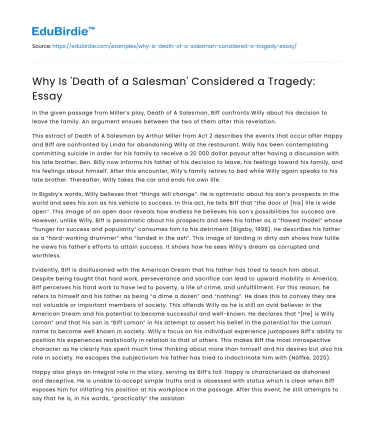In the given passage from Miller’s play, Death of A Salesman, Biff confronts Willy about his decision to leave the family. An argument ensues between the two of them after this revelation.
This extract of Death of A Salesman by Arthur Miller from Act 2 describes the events that occur after Happy and Biff are confronted by Linda for abandoning Willy at the restaurant. Willy has been contemplating committing suicide in order for his family to receive a 20 000 dollar payout after having a discussion with his late brother, Ben. Billy now informs his father of his decision to leave, his feelings toward his family, and his feelings about himself. After this encounter, Wily’s family retires to bed while Willy again speaks to his late brother. Thereafter, Willy takes the car and ends his own life.
Save your time!
We can take care of your essay
- Proper editing and formatting
- Free revision, title page, and bibliography
- Flexible prices and money-back guarantee
In Bigsby’s words, Willy believes that “things will change”. He is optimistic about his son’s prospects in the world and sees his son as his vehicle to success. In this act, he tells Biff that “the door of [his] life is wide open”. This image of an open door reveals how endless he believes his son's possibilities for success are. However, unlike Willy, Biff is pessimistic about his prospects and sees his father as a “flawed model” whose “hunger for success and popularity” consumes him to his detriment (Bigsby, 1998). He describes his father as a “hard-working drummer” who “landed in the ash”. This image of landing in dirty ash shows how futile he views his father's efforts to attain success. It shows how he sees Willy’s dream as corrupted and worthless.
Evidently, Biff is disillusioned with the American Dream that his father has tried to teach him about. Despite being taught that hard work, perseverance and sacrifice can lead to upward mobility in America, Biff perceives his hard work to have led to poverty, a life of crime, and unfulfillment. For this reason, he refers to himself and his father as being “a dime a dozen” and “nothing”. He does this to convey they are not valuable or important members of society. This offends Willy as he is still an avid believer in the American Dream and his potential to become successful and well-known. He declares that “[He] is Willy Loman” and that his son is “Biff Loman” in his attempt to assert his belief in the potential for the Loman name to become well known in society. Willy’s focus on his individual experience juxtaposes Biff’s ability to position his experiences realistically in relation to that of others. This makes Biff the most introspective character as he clearly has spent much time thinking about more than himself and his desires but also his role in society. He escapes the subjectivism his father has tried to indoctrinate him with (Nöffke, 2020).
Happy also plays an integral role in the story, serving as Biff’s foil. Happy is characterized as dishonest and deceptive. He is unable to accept simple truths and is obsessed with status which is clear when Biff exposes him for inflating his position at his workplace in the passage. After this event, he still attempts to say that he is, in his words, “practically” the assistant buyer when he is actually the assistant’s assistant. This shows how in denial he is and his obsession with power. Contrary to his brother, Biff is able to accept the truth about his position in society. He voluntarily exposes that he was a thief who served jail time in this passage. This shows how honest and accountable he is and exposes their difference in integrity more.
Unfortunately, Linda is the most overlooked and ignored character. Throughout Death of A Salesman, Linda remains a character who, in the words of Bigbsy, maintains a “supporting role”. During this passage, Linda barely says a word except for the words “Don’t Biff” in order to calm him down. Even these words that she says show how all her verbal expression is focused on supporting others in dealing with their emotions and anger as opposed to expressing her own thoughts. She is constrained by the patriarchy to this role. When she does express her emotions through crying in this passage, Biff dismisses her feelings by saying “Stop crying. I’m through with it”. This dismissal depicts how insignificant she is seen to be as a woman in the family. She is a “committed observer” (Bigsby, 1998) who does not and cannot actively assert herself, despite her efforts.
Ultimately, Willy Loman can be classified as a tragic hero according to Aristotle’s definition. His hamartia is his obsession with the American dream and immense pride. This can be seen in how he arrogantly denies that he is not “a dime a dozen” even though he lost his job earlier on in the play. This inability to accept his poverty and failed attempt at achieving the American dream portrays his obsessive and prideful nature. This pride is similar to that of Ancient Greek tragic heroes. To add, he, like most Ancient Greek heroes, has a peripeteia. It is the poverty he experiences despite his “preoccupation with urban life” (Nöffke, 2020). This makes him somewhat different from Ancient Greek tragic heroes who have a downfall from greatness because he never becomes wealthy. Lastly, like the Ancient Greek tragic heroes, Willy Loman experiences a tragic death when he commits suicide.
In conclusion, the passage illustrates the final conflict in the play. It reveals the differences between Biff, Happy, and Willy Loman while failing to elevate Linda's past to more than just a supporting role. Biff exposes his true emotions whilst his father and brother remain in denial.






 Stuck on your essay?
Stuck on your essay?

